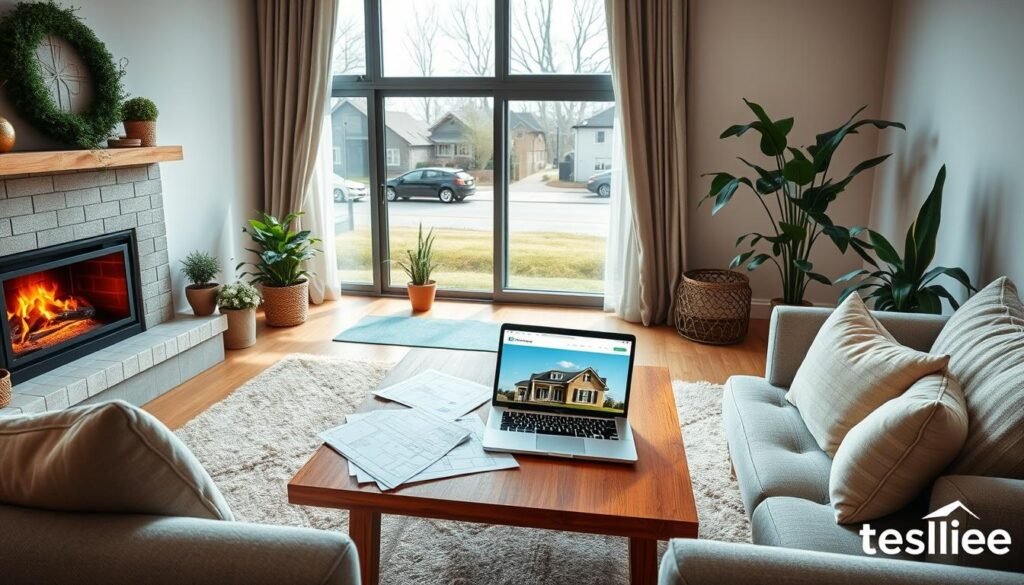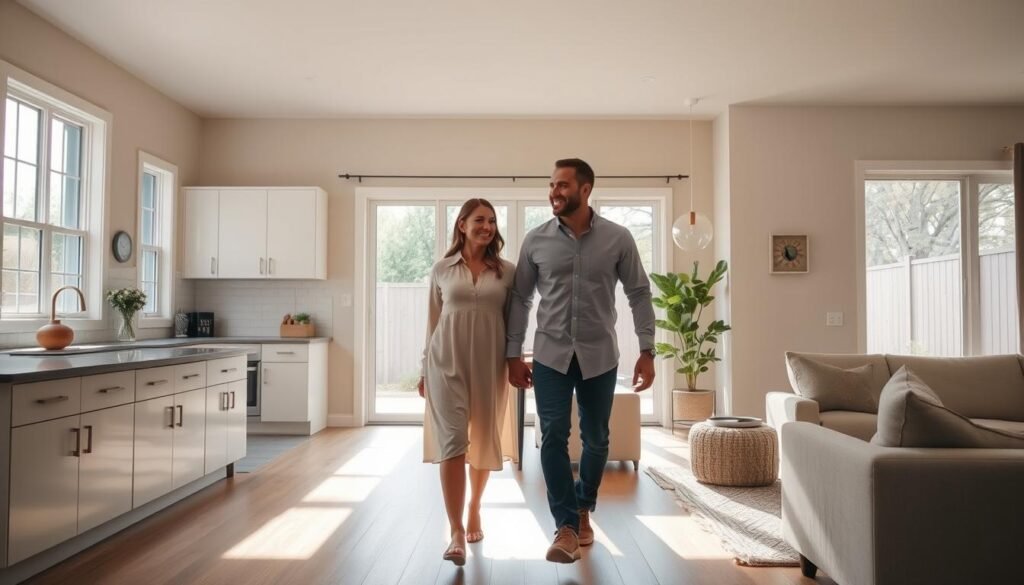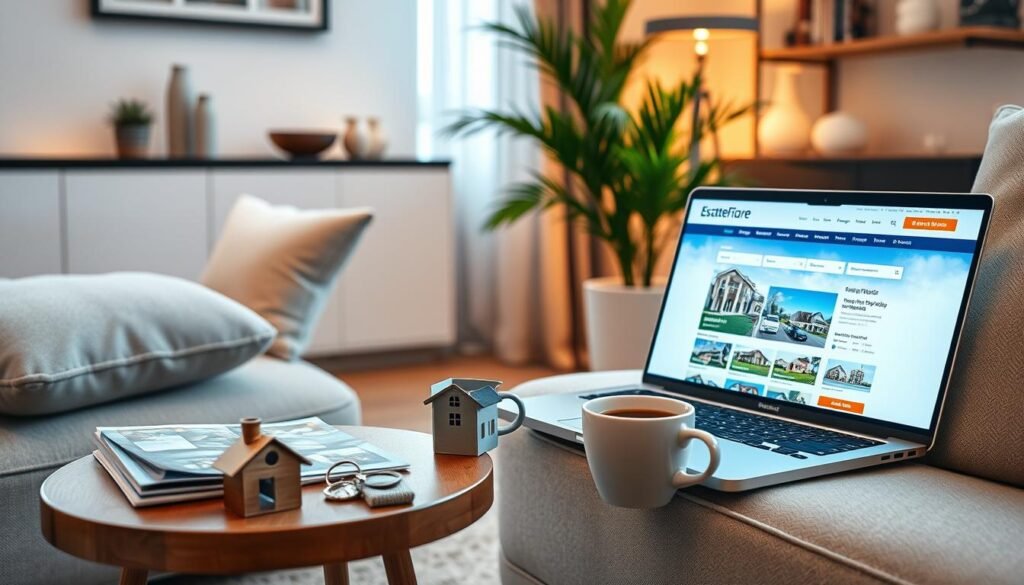Buying Your First Home is both thrilling and challenging, especially for first-timers. But with the right help and preparation, it can be smooth and fulfilling. This guide offers expert advice and tips to help you through the home-buying process. It’s designed to help you achieve your dream of owning a home.
Key Takeaways
- Understand the home-buying process from start to finish
- Determine your budget and get pre-approved for a mortgage
- Find the right real estate agent to guide you through the journey
- Explore neighborhoods and properties that fit your needs and preferences
- Navigate the offer, negotiation, and closing processes with confidence
This guide is for anyone looking to buy their first home or wanting to learn more. It’s packed with tools and insights to help you make smart choices. With this guide, you’ll be well on your way to securing your dream home.
Understanding the Home Buying Process
Starting your home buying journey is exciting but can feel overwhelming. Knowing the key steps and what to expect is crucial. We’ll help you understand the preparation and research needed to make smart choices.
Preparation and Research
Before you start looking for homes, prepare and research the market. Check your finances, including your credit score and savings. Set a budget that matches your financial goals.
Learn about the local real estate market. Know the average home prices, rental rates, and trends. This knowledge will help you make informed decisions.
- Assess your financial readiness, including credit score, savings, and debt
- Determine a realistic home buying budget that fits your long-term goals
- Research the local real estate market to understand pricing, trends, and market conditions
Setting Realistic Expectations
It’s important to have realistic expectations when buying a home. Finding the perfect home takes time, and you might need to compromise. Remember, owning a home comes with costs like maintenance and repairs.
- Expect the home buying process to take time and require compromise
- Understand the financial responsibilities and ongoing costs of home ownership
- Prepare for the emotional journey and be patient throughout the process
By preparing well and setting realistic expectations, you’ll be ready to navigate the home buying process. You’ll make choices that fit your goals and budget.
| Key Preparation Steps | Realistic Expectations |
|---|---|
|
|
“The home buying process is a journey, not a race. Take the time to prepare, set realistic expectations, and make informed decisions that align with your long-term goals.”
Buying your first home: Where to Start
Starting to buy your first home can seem daunting. But, with the right steps, you can feel confident. Begin by thinking about what you need in a home, getting to know the local market, and planning your path.
First, think about your lifestyle, budget, and future plans. What kind of home do you want? How many rooms do you need? Are you looking for a house, condo, or townhouse? Knowing what you want helps you find the right home.
Then, dive into the local real estate scene. Look at online listings, visit open houses, and learn about prices and trends. This helps you set realistic expectations and spot good or bad areas.
- Explore your housing needs and preferences
- Research the local real estate market
- Attend open houses and view listings
- Identify neighborhoods that align with your lifestyle
By starting with these steps, you’re ready to begin your where to start buying first home journey. Remember, finding your home takes time and effort. But with a solid plan, you’ll make great choices and find your dream home.

“Buying your first home is an exciting milestone, but it’s important to approach the process with a clear plan and a thorough understanding of the market. By taking the time to define your needs and explore your options, you’ll be well on your way to finding the perfect property to call home.”
Budgeting and Financing
Creating a solid home buying budget and getting mortgage pre-approval are key steps. These steps help you make smart offers and deal with the home-buying process.
Determining Your Budget
Start by figuring out a budget that fits your finances. Look at your income, debts, living costs, and savings. This way, you can afford your mortgage and still have money for other things.
Make a list of your monthly bills, like rent, utilities, and car payments. This helps you see how much you can spend on a mortgage each month.
Mortgage Pre-Approval
After setting your budget, get mortgage pre-approval. This means a lender checks if you can get a loan. Pre-approval shows sellers you’re serious and can afford a home.
Your lender will check your credit, income, and debts. They’ll then give you a pre-approval letter. This letter is important for negotiating with sellers.
“Securing pre-approval is one of the most important steps in the home buying process. It not only demonstrates your financial readiness to sellers but also helps you understand your true purchasing power.”
By planning your home buying budget and getting mortgage pre-approval, you’re ready to find your first home.
Finding the Right Real Estate Agent
Choosing the right real estate agent is crucial for a smooth home-buying journey. Look for certain qualities in an agent to ensure a successful experience.
Qualities to Look for in an Agent
When searching for a real estate agent, focus on these qualities:
- Local Expertise: An agent familiar with the local market can offer valuable insights. They know neighborhood trends, property values, and available listings.
- Communication Skills: Good communication is key. Look for an agent who is responsive, listens well, and keeps you updated.
- Negotiation Prowess: A skilled negotiator can get you the best deal. They handle price negotiations and complex contracts.
- Industry Experience: An experienced agent can guide you. They know how to avoid common mistakes, especially for first-time buyers.
- Trustworthiness: Your agent will handle a big financial decision. Choose someone who is honest, transparent, and has your best interests in mind.
By focusing on these qualities, you can find a great real estate agent. This increases your chances of a positive home-buying experience.
| Quality | Importance |
|---|---|
| Local Expertise | Provides valuable insights into the local market, including neighborhood trends, property values, and available listings. |
| Communication Skills | Ensures effective communication, responsiveness, and keeping you informed throughout the home-buying process. |
| Negotiation Prowess | Helps you secure the best possible deal on your dream home through savvy price negotiations and contract management. |
| Industry Experience | Provides guidance and helps you avoid common pitfalls that first-time buyers often encounter. |
| Trustworthiness | Ensures transparency, honesty, and that your best interests are prioritized throughout the home-buying process. |
Remember these qualities when searching for a real estate agent. They will help you find the right qualities of real estate agent and achieve your homeownership goals.
Exploring Neighborhoods and Properties
Starting your first home-buying journey means exploring neighborhoods and properties. This step helps you find your dream home. You’ll discover areas you like and the features that fit your lifestyle.
When exploring neighborhoods, think about schools, community amenities, commute times, and safety. Visit the areas you’re interested in. Walk around to feel the vibe and atmosphere. This will help you find neighborhoods that match your preferences and needs.
- Research the local school district ratings and test scores if you have or plan to have children.
- Investigate the availability of parks, recreational facilities, and other community resources that align with your lifestyle.
- Assess the commute times to your workplace or other important destinations to ensure a manageable daily routine.
- Observe the overall safety and cleanliness of the neighborhoods, taking note of any potential concerns.
After finding the neighborhoods you like, start searching for properties. Use online real estate platforms, attend open houses, and work with your real estate agent. Look at the features, layout, and condition of each property. Also, consider the surrounding area and any issues.
“Exploring neighborhoods and properties is like piecing together the puzzle of your future home. Take your time, trust your instincts, and you’ll find the perfect fit.”
By exploring neighborhoods and searching for properties, you’ll understand the local real estate market better. This will help you find a home that fits your vision and budget. Remember, this step is key in the home-buying process. Approach it with care and an open mind.
Making an Offer and Negotiating
Once you’ve found the home of your dreams, it’s time to make an offer and negotiate the terms. This step is crucial and can greatly impact your home-buying journey. It’s important to understand the process and use effective negotiation tactics.
Understanding the Contract
The home purchase contract is a legally binding document. It outlines the terms and conditions of the transaction. It’s crucial to thoroughly review the contract and understand its components, such as the purchase price and closing date.
Be familiar with the standard clauses. Be prepared to negotiate any terms that may not align with your interests.
Negotiation Tactics
- Research the market: Gather information about recent sales in the area to determine a fair offer price.
- Start low: It’s generally advisable to make an initial offer slightly below the asking price, leaving room for negotiations.
- Emphasize your strengths: If you have a pre-approved mortgage or are a cash buyer, highlight these advantages to strengthen your position.
- Be flexible: Consider negotiating on aspects such as the closing date, appliances, or other concessions to reach an agreement.
- Remain calm and professional: Avoid emotional outbursts or ultimatums, as these can hurt your chances of a successful negotiation.
Navigating the making home offer and negotiating home purchase process can be daunting. But with a solid understanding of the home purchase contract and effective negotiation tactics, you can secure the best possible deal for your first home.

| Negotiation Tactic | Description |
|---|---|
| Research the market | Gather information about recent sales in the area to determine a fair offer price. |
| Start low | Make an initial offer slightly below the asking price, leaving room for negotiations. |
| Emphasize your strengths | If you have a pre-approved mortgage or are a cash buyer, highlight these advantages to strengthen your position. |
| Be flexible | Consider negotiating on aspects such as the closing date, appliances, or other concessions to reach an agreement. |
| Remain calm and professional | Avoid emotional outbursts or ultimatums, as these can hurt your chances of a successful negotiation. |
Home Inspections and Appraisals
As first-time home buyers, it’s key to do a home inspection and get an accurate appraisal. These steps are vital for making a smart investment. They give you important insights to help you decide wisely and avoid problems.
A professional home inspection looks for hidden issues or defects in the property. The inspector checks the home’s exterior, interior, plumbing, electrical, heating, ventilation, and air conditioning (HVAC) systems. They also assess the overall condition of the property. This detailed check can help you spot potential problems and negotiate the price.
- The home inspection covers a wide range of components, including the roof, walls, floors, windows, doors, and more.
- It also examines the home’s major systems, such as plumbing, electrical, and HVAC, to ensure they are functioning properly.
- The inspection report provides a detailed evaluation of the home’s condition, allowing you to make an informed decision.
Also, a professional home appraisal is key to figuring out the property’s fair market value. The appraiser looks at the home’s features, condition, and location. This helps you get the right mortgage and avoid overpaying.
“A home inspection is an essential step in the home buying process, as it can uncover issues that may not be immediately visible to the untrained eye. It’s a small investment that can save you from costly surprises down the line.”
Understanding the importance of home inspections and appraisals helps you make a better decision. This ensures your first home purchase is a wise investment.
Closing the Deal
As you near the end of the home-buying process, the final steps are key. This includes the final walk-through and understanding closing costs. Let’s explore these stages to make your first home purchase smooth and successful.
Final Walk-Through
The final walk-through is your last chance to check the property before buying. You’ll make sure the home is as agreed upon and any repairs are done.
It’s crucial to inspect the property well. Look for any new issues or concerns. This is your last chance to fix anything before you sign the final papers and own the home.
Closing Costs Explained
Closing costs are fees for the home purchase. They include loan origination fees, appraisal fees, title insurance, and more. Knowing and planning for these costs is key to a successful closing.
Before closing, your lender will give you a detailed list of costs. Carefully review this list. If you’re unsure about anything, ask your real estate agent or lender for help.
| Closing Cost Category | Typical Cost Range |
|---|---|
| Loan Origination Fees | 0.5% – 1.5% of the loan amount |
| Appraisal Fees | $300 – $500 |
| Title Insurance | 0.5% – 1% of the home’s value |
| Recording Fees | $100 – $200 |
| Homeowner’s Insurance | Varies based on coverage |
By knowing about the final walk-through and closing costs, you’re ready to close your home purchase. You’ll make the transition to homeownership smoothly and confidently.

Moving and Settling In
Congratulations! You’ve bought your new home. Now, it’s time to move and settle in. This might seem hard, but with the right steps, you can make it easy.
First, make a detailed moving plan. Find a good moving company, pack your stuff, and switch utilities. Being organized will make the move less stressful.
When you get to your new home, start unpacking slowly. Arrange each room to feel right and useful. This is your chance to make the place your own.
Explore your new area as you settle in. Walk around, meet neighbors, and find local spots. This will help you feel part of the community.
Remember, moving is a journey, not just a move. Be kind to yourself and ask for help when needed. With a good attitude and a plan, you’ll love your new home soon.
Unpacking and Organizing Tips
- Unpack the basics first (like bed, kitchen, and bathroom)
- Label boxes by room and what’s inside to make unpacking easier
- Use storage like shelves and organizers to keep things neat
- Take breaks and celebrate your small wins
Exploring Your New Neighborhood
- Take a walk or bike ride to get to know the area
- Meet your neighbors and swap numbers
- Look up local shops, parks, and community centers
- Find important services like hospitals and fire stations
Follow these tips to make your new home welcoming. Enjoy this new chapter of your life!
Homeownership Tips and Advice
Being a new homeowner means keeping up with maintenance and making smart improvements. We offer expert advice on everything from daily upkeep to big renovations.
Maintenance and Repairs
Home maintenance doesn’t have to be hard. Create a cleaning and inspection routine to catch problems early. This helps your home’s systems and appliances last longer. Here are some tips:
- Clean gutters and downspouts often to avoid water damage
- Check and change air filters in your HVAC system for better efficiency
- Regularly inspect your plumbing, electrical, and roof for any issues
For repairs, try simple tasks yourself but call a pro for big jobs. Good tools and materials save money over time.
Home Improvements
Homeownership lets you make your space your own and boost your home’s value. Here are some ideas to improve your home:
- Update your kitchen with new appliances, countertops, and paint
- Give your bathrooms a makeover with new fixtures and tile
- Add a deck, patio, or landscaping to your outdoor area
- Finish your basement or attic for more living space
Not all improvements are worth it. Research and plan your projects to fit your goals and budget.

“Investing in regular home maintenance and strategic improvements can not only enhance your living experience but also increase the long-term value of your property.”
Common Mistakes to Avoid
When buying a home for the first time, it’s important to know common mistakes. Knowing these can help you avoid costly errors. Let’s look at some common mistakes and how to avoid them.
- Skipping the pre-approval process: Not getting pre-approved can make it hard to compete with other buyers. Make sure your financing is ready before you start looking for homes.
- Overlooking the hidden costs: There are costs like closing fees, moving costs, and maintenance that you need to think about. Ignoring these can cause financial problems.
- Ignoring the importance of location: The location of your home is as important as the house itself. Think about commute time, local amenities, and schools when choosing a place.
- Rushing the decision-making process: Buying a home is a big deal. Take your time to look at each property carefully. Don’t rush into a decision, or you might regret it.
- Failing to inspect the property: Not getting a professional inspection can lead to hidden problems and expensive fixes later. Make sure to get a thorough inspection before making an offer.
| Common Home Buying Mistakes | Explanation |
|---|---|
| Skipping the pre-approval process | Failing to get pre-approved for a mortgage can put you at a disadvantage when competing with other buyers. |
| Overlooking the hidden costs | Beyond the purchase price, there are additional expenses like closing costs, moving expenses, and ongoing maintenance that need to be factored into your budget. |
| Ignoring the importance of location | The location of your future home is just as crucial as the property itself. Consider factors like commute time, neighborhood amenities, and the quality of local schools. |
| Rushing the decision-making process | Buying a home is a significant investment, and it’s essential to take the time to thoroughly evaluate each property. |
| Failing to inspect the property | Skipping a professional home inspection can result in hidden issues and costly repairs down the line. |
Being aware of these common home buying mistakes can help you have a successful home-buying experience. Knowledge and preparation are key to making good decisions in the real estate market.
“Buying a home is one of the biggest financial decisions you’ll ever make, so it’s crucial to approach it with care and caution.”
Resources for First-Time Home Buyers
Starting your journey to become a homeowner is exciting. There are many resources to help you. You’ll find educational materials, government programs, and tools from the industry. These will guide you and help you reach your goal of owning a home.
Educational Resources
- First-Time Homebuyer Guides: Detailed guides from reputable sources like the Consumer Financial Protection Bureau and HUD that cover the entire home-buying process.
- Home-Buying Courses: Online and in-person courses that provide step-by-step instructions and expert advice on navigating the market.
- Homebuyer Workshops: Local and national events that offer hands-on guidance and networking opportunities with industry professionals.
Government Assistance Programs
- FHA Loans: Insured by the Federal Housing Administration, these loans offer lower down payments and more lenient credit requirements for first-time buyers.
- VA Loans: Available to eligible service members, veterans, and their families, VA loans feature no down payment and competitive interest rates.
- State and Local Homebuyer Assistance: Many states and municipalities offer down payment grants, tax credits, and other incentives for first-time home buyers.
Industry-Specific Tools
| Tool | Description |
|---|---|
| Mortgage Calculators | Online tools that help you estimate your monthly payments, budget, and affordability. |
| Home Valuation Websites | Platforms that provide estimated home values and market insights to help you make informed offers. |
| Real Estate Listing Portals | Comprehensive databases of homes for sale, allowing you to search and compare properties. |
By exploring these resources for first-time home buyers, you’ll be well-equipped to navigate the complex world of real estate. You’ll make the most informed decisions on your path to homeownership.

“Homeownership is a journey, not a destination. With the right resources and guidance, you can make it a rewarding experience.”
REAL ESTATE NEGOTIATION TACTICS: EXPERT STRATEGIES
Conclusion
Buying your first home is a big deal. By following the expert tips and advice in this guide, you’ll be ready. You’ll make smart choices that fit your needs and budget.
We’ve covered all the key steps for first-time buyers. You’ll learn about the home-buying process, budgeting, and financing. Plus, finding the right real estate agent is crucial.
As you start this journey, stay focused and patient. Seek help from experienced pros. With the right mindset and prep, you’ll enjoy the benefits of homeownership. Congratulations on this big step, and we wish you the best in finding your dream home.



